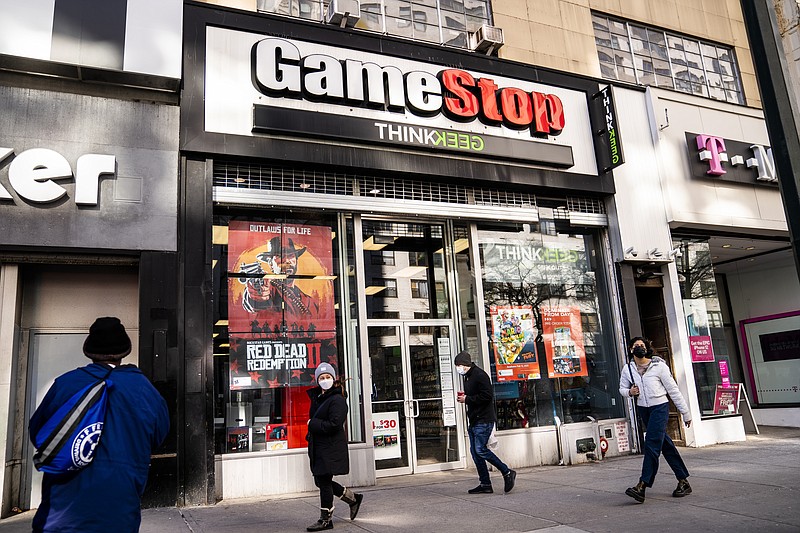WASHINGTON -- Key players in the GameStop saga faced questions Thursday from House lawmakers concerned that, even as investing becomes more democratized, the scales are still tilted in favor of the big Wall Street institutions.
GameStop shares soared 1,600% in January before retreating sharply. The drama entangled huge short-selling hedge funds, a social media message board and ordinary investors wanting in on the hottest new trade.
Some of the toughest questions and harshest criticism was directed at Vlad Tenev, chief executive officer of Robinhood, which operates an online trading platform that is popular with individual investors. Tenev defended Robinhood against allegations that trading restrictions it put in place at the height of the GameStop frenzy disadvantaged those smaller investors in favor of bigger institutional clients.
The head of the Financial Services Committee, Rep. Maxine Waters, D-Calif., grilled Tenev on those restrictions. She also asked Tenev about Robinhood's close relationship with Citadel Securities, which she maintains poses a conflict of interest.
At issue is the common practice in the securities markets of payment for order flow, in which Wall Street trading firms such as Citadel Securities pay companies like Robinhood to send them their customers' orders for execution. In addition, platforms like Robinhood give the trading firms data on stocks its users are buying and selling.
Both Tenev and Ken Griffin, the CEO of Citadel, denied that Citadel had any role in Robinhood's decision to restrict trading in GameStop and some other volatile stocks.
[Video not showing up above? Click here to watch » https://www.youtube.com/watch?v=-_4Wv2wtmwM]
Tenev said Robinhood imposed the trading restrictions solely to meet capital requirements set by regulators. Still, he apologized to Robinhood customers.
"Despite the unprecedented market conditions in January, at the end of the day, what happened is unacceptable to us. To our customers, I apologize, and please know we are doing everything we can to make sure this can't happen again."
The panel's senior Republican, Rep. Patrick McHenry of North Carolina, put forward conservatives' view that the GameStop episode shouldn't be used by Washington to bring new regulations on the markets.
Committee member U.S. Rep. French Hill, R-Ark., a former Little Rock banker, questioned Tenev and noted his own work in helping Eastern Europe launch free market economies after the collapse of the Iron Curtain in 1989.
Hill worked at the Treasury Department during the administration of President George H.W. Bush. Tenev and his parents immigrated to the U.S. from Bulgaria soon after the fall of the Soviet Union.
Speaking with reporters after Thursday's hearing, Hill discussed the recent GameStop trading.
"I've seen a lot of bubble activity, starting out in '79 and '80 with the corner on the silver market by the Hunt brothers in Dallas, and all the way through the dot.com boom and the mortgage crisis in '08," Hill said.
"Individual actions in an individual stock, or a group of stocks, that create a frenzy, with or without a short position involved in it are not uncommon in the capital markets," Hill said. "GameStop has a classic bubble diagram in terms of its graph going parabolic."
"If you look back, everything from the bubble of tulips in the 18th century [or] 17th century all the way to today, you see that same pattern repeat itself," Hill said.
The GameStop frenzy didn't reveal structural problems in the overall system, Hill suggested.
"I think our regulatory system worked precisely as it was intended," he said.
ROARING KITTY
Also appearing before the committee was Keith Gill, who earned a handsome profit and a legion of online followers for making the case for GameStop shares on Reddit and YouTube long before the big surge in the price in January. Gill, known as Roaring Kitty on YouTube, is known for his cat-themed T-shirts and a bright red runner's headband in widely followed videos.
Gill told lawmakers that he reaped a profit on his investment because he did his homework, and not because he touted the stock.
"The idea that I used social media to promote GameStop stock to unwitting investors and influence the market is preposterous," Gill said.
"My posts did not cause the movement of billions of dollars into GameStop shares. It is tragic that some people lost money and my heart goes out to them."
GameStop shares rose as high as $483 in January but reversed course this month. Shares fell 11% to close at $40.69 Thursday.
SMALL INVESTORS MOBILIZE
Small investors were initially seen as the winners after they mobilized against Wall Street heavies on the subreddit (user-created Reddit community) WallStreetBets. Their buying swelled the share prices of GameStop and other beaten-down companies beyond anyone's imagination.
Not coincidentally, the rally inflicted billions in losses on the hedge funds that had placed bets that the stocks would drop, a practice known as short-selling.
As the GameStop frenzy escalated, the acting head of the Securities and Exchange Commission said the agency is examining the trading restrictions imposed by Robinhood and other online brokerages as well as possible stock manipulation, and the role that short-selling may have played in GameStop's extreme price swings.
Information for this article was contributed by Marcy Gordon, Matt O'Brien and Alex Veiga of The Associated Press and by Frank E. Lockwood of the Arkansas Democrat-Gazette.

